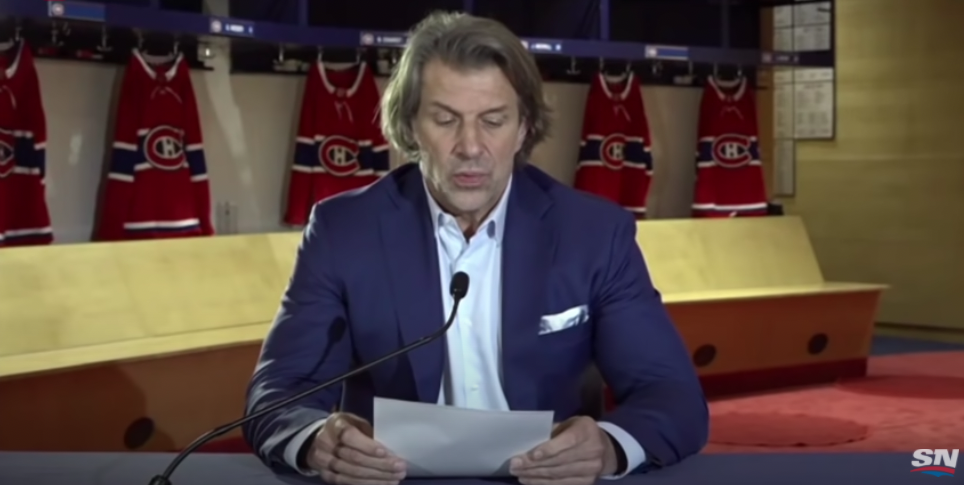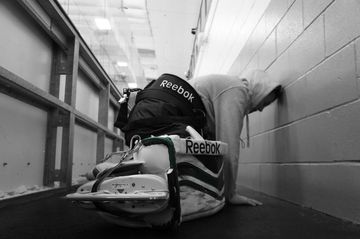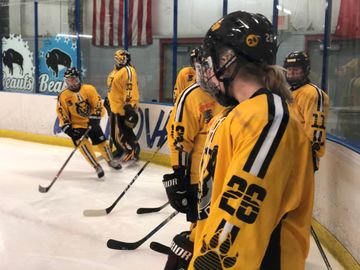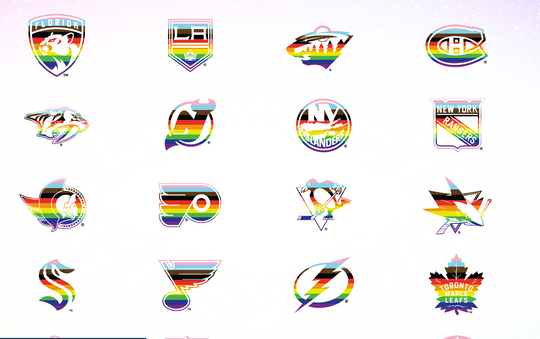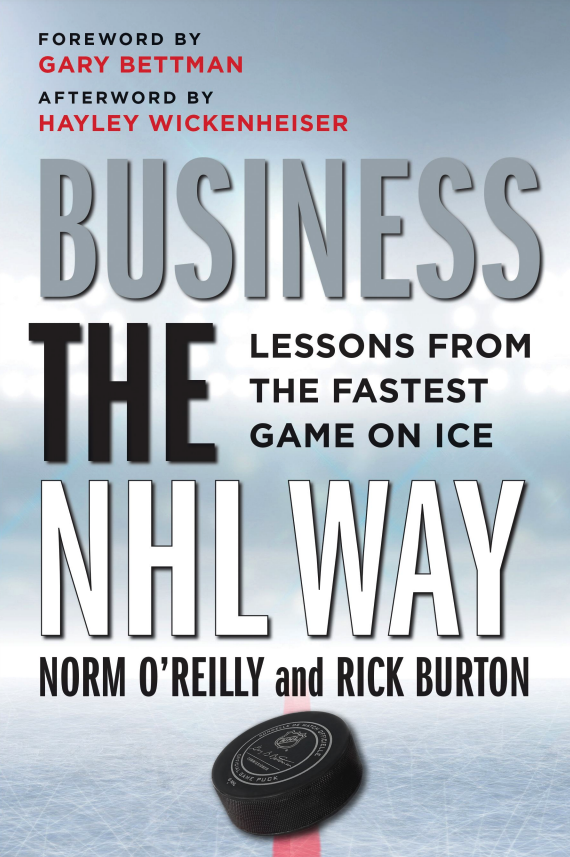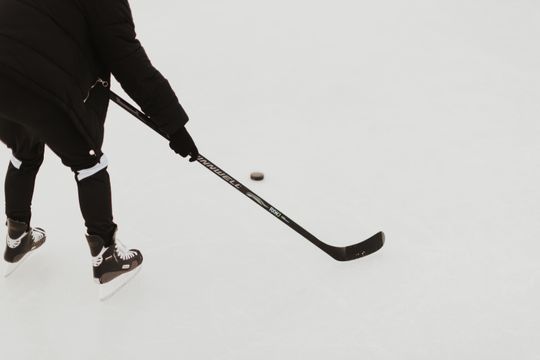This offseason has been dominated by off-ice issues for the NHL.
At the draft in July, the Montreal Canadiens provoked the ire of many across the sport by selecting a player, Logan Mailloux, who was convicted in Sweden of distributing an explicit photo of a woman without her consent. Prior to the draft, Mailloux requested teams not select him, in an effort to move beyond the controversy. The Canadiens selected him anyway.
Less than a week later, the Carolina Hurricanes signed free agent Tony DeAngelo to a one-year deal for $1 million. DeAngelo, who was suspended twice in the same season for violating the OHL's inclusion policy while a member of the Sarnia Sting, played just 6 games of his last contract, before being released for his role in an altercation with a teammate. This came after months of vocal support of then-U.S.-President Donald Trump, pandemic denialism, and a high-profile move to social media platform Parler, which is popular with fascists and white nationalists.
On July 31, the NHL announced it would be investigating reports that San Jose Sharks forward Evander Kane was gambled on NHL games during the 2021 season. The league responded quickly to the gambling allegations, announcing "the integrity of our game is paramount and the League takes these allegations very seriously."
Constantly simmering in the background of these incidents has been the ongoing investigation into the conduct of Chicago management as part of a lawsuit from two former Chicago players. The players assert that video coach Brad Aldrich sexually assaulted them in 2010. The investigation is probing team management's culpability and its positive endorsement of Aldrich after quietly dismissing him the summer following the allegations.
The hypocrisy abounds. The NHL immediately launched an investigation into the allegations of gambling against Evander Kane – but they avoided making any moves about the situation in Chicago for as long as possible. It seemed to stun the hockey world that the Canadiens, fresh off an unexpected appearance in the Stanley Cup Finals for the first time in nearly 30 years, would make such a poor selection at the draft and undermine the goodwill generated by their historic postseason run. And the Hurricanes' choice to sign DeAngelo felt like a betrayal after the team's social media outreach has earned the organization much praise and many new fans who have traditionally felt shut out of hockey.
But these feelings of shock and betrayal were dependent on believing the words. The NHL, its teams, players, and personnel, have a new vocabulary, and they are using it to great effect. After years of lagging behind and numerous missteps, men's hockey now understands they must sound like they care about marginalized people, discrimination, and abusive behavior. We only must examine these recent incidents to understand how men's hockey has carefully co-opted the words and language of activists and survivors to suit its own needs.
The Canadiens' actions after drafting Mailloux perfectly illustrate the new script. Minutes after selecting the London Knights player at 31st overall, Montreal released a statement acknowledging Mailloux's conviction and the organization's "commitment to accompany Logan on his journey by providing him with the tools to mature and the necessary support to guide him in his development," as well as building awareness among other players that their actions have repercussions. The timing of the statement, issued in both French and English almost immediately after GM Marc Bergevin made the selection, indicates that the decision to draft Mailloux was made in advance. The pick was deliberate and the explanation was a strategy.
Since this was a calculated decision, one might expect that Bergevin (who has been the GM since 2012) and the rest of the Canadiens organization had a plan in place to address the fallout from this deliberate decision. It would also be reasonable to assume that they had a program to provide Mailloux with the needed stability and guidance during his "development journey." Surely if one is willing to risk their reputation to offer a second chance to a player in Mailloux's position, they'd have a clear strategy for ensuring his success and progress.
However, Geoff Molson's follow up statement further undermined Montreal's claims of providing guidance: "Over the course of the next few months, we will develop in conjunction with local experts, a comprehensive plan to raise awareness and educate young men and young women about this serious issue. We will use our platform and our resources to turn a decision that hurt many people into one that brings meaningful and impactful change." Molson's comments reveal not an organization committed to the important and difficult task of harm reduction and rehabilitation, but an owner who has no concept of the meaning of his words or the scope of his responsibility. Apparently Montreal feels its well-suited to "educate young women" about the impact of sexual harassment, assault, and other topics – despite their insistence on centering and selecting Mailloux. This plan is half-baked at best and we may in fact never hear about it again.
In other words, the Canadiens learned the script, but not the role. Montreal simply co-opted a type of progressive language many fans and ally organizations have used to effect change in men's sports. The team statement illustrates this: "We are making a commitment to accompany Logan on his journey by providing him with the tools to mature and the necessary support to guide him in his development." But management's actual actions fall short. When fans and hockey media pushed back against the selection, Montreal's "commitment" disintegrated. The team asked Mailloux not to attend its prospect development camp this summer (where I would presume a certain amount of guidance and development takes place) in an attempt to mitigate the fallout. If Mailloux feels that the tide turned quickly against him, perhaps he would be comforted to know that it's a strategy the Canadiens have used before, waiving current Oiler Zack Kassian as soon as he had completed the NHL's substance abuse program in 2015. Once NHL teams deem that a player's profitability has irrevocably depreciated, the player is cut loose.
The notion the Canadiens pitched, that they would mentor a player through a second chance they had decided he deserved based on their assessment of his remorse, was as superficial as a shooter target. The "Mailloux Second Chance" was not Bergevin and the Canadiens' attempt at some sort of hockey-centric restorative justice. The post-pick media strategy was more Potemkin village, orchestrated to distract and disarm criticism.
There was never a real plan, as Molson revealed, and there was never a commitment to do the work, which we all should have known. There are serious questions as to whether Bergevin is a suitable role mode. The Habs GM has shown interest in bringing Slava Voynov (domestic assault) back to the NHL; he hired Sean Burke (domestic assault) as the team's current director of goaltending; and was interested in acquiring Tony DeAngelo at the trade deadline. Bergevin was also a member of Chicago's front office at the time as Brad Aldrich and has said he had no knowledge of the abuse, despite being the Director of Player Personnel. These men are so obviously ill-suited to the task.
This is the predictable result of advocacy work that does not demand material change. Ally organizations, hockey media, and many fans have relied on watered down sentiments such as "Hockey is for Everyone" and "If You Can Play, You Can Play" to challenge those in the sport to be better. Collectively, we've focused on challenging the language of the game, the use of slurs, to make it more welcoming. There is a role for this – men's hockey is certainly more welcoming to everyone else when racist, sexist, queerphobic, and ableist language is challenged and eliminated. But would any of us be shocked if the Bergevins of the hockey world interpreted "Hockey is for Everyone" as a call to include those who assault women or "If You Can Play, You Can Play" as a directive to secure the services of a blatant racist?
Focusing on words without interrogating deeds does not fundamentally challenge the deep-seated cultural norms of the men's game. Safety for all cannot be achieved through mere assimilation of marginalized fans and players, the very foundations of the culture must be dismantled. From a 2017 essay I wrote about queer inclusion:
Ultimately, sports leagues and teams have a greater responsibility to initiate systemic change and to foster safe spaces for all queer fans because of the role sports, especially men's sports, play in creating, maintaining, and sustaining heteronormative and cisnormative culture. Sports like baseball and hockey elevate a certain kind of manhood that emphasizes physical strength and participation in violence as appropriate expressions of masculinity. Discarded in its wake is everyone who does not fit this white, cis, straight masculine ideal ...
The "Code" of men's hockey, an informal list of arbitrary rules governing player behavior, is inherently racist, sexist, and queerphobic. Punishment for transgressing the Code is similarly racist, sexist, and queerphobic. Punishment for violations is built into the fabric of the game through physical violence. Without changing the fundamentals of the game, the type of institutional change hockey requires and fans demand, is impossible to achieve. Montreal's move away from Mailloux should not be read as a commitment to any type of progressive action; rather, it should be seen for the transparent self-interest it represented. Montreal, like all NHL clubs, refuses to engage in the necessary work to match its words.
The Canadiens have tried to use redemption arcs in the past to disguise the hypocrisy of their motivated self-interest. In 2017, the Habs selected Andrew Shaw as the team's You Can Play Ambassador, only a few months after he used a homophobic slur during a game, for which he only apologized for after video evidence confirmed. As I wrote at the time:
Shaw's YCP approved allyship has been opposed by many LGBTQ fans but just as many mainstream cis and straight writers have come to his defense, believing he has changed, that he deserves a second chance, that the good he does on the ice outweighs any bad.
Shaw's selection for this role was neither arbitrary nor misguided. It was calculated to mitigate the harm, and the outcry, of the organization supporting an obviously homophobic player. Because an ally organization, in this instance You Can Play, giving an opportunity to literally any player in the dressing room regardless of their suitability, Montreal was able to lessen criticism of their blatant disregard for queer people because Shaw learned the script and hockey's mainstream media helped convey the message.
This pretty well sums up what Andrew Shaw had to say today. pic.twitter.com/srtkvcw68Y
— Arpon Basu (@ArponBasu) February 3, 2017
On the night the Canadiens selected Mailloux, Montreal's pick was followed up by a pick by Chicago. Facing mounting criticism over the 2010 accusations against Aldrich, embattled GM Stan Bowman appeared on the video feed flanked by a phalanx of recent team hires. That they were all women was not a coincidence; Bowman himself drew attention to that fact. Three, Karilyn Pilch (scout), Brigette Lacquette (pro scout), and Kelsey Koelzer (scout, player personnel) are recent hires. Chicago's move was also accompanied by a press release, showing that it was an intentional and deliberate decision made in advance.
What a slap in the face. Absolutely disgusting to use these women as a shield and to say you are making your org better. @NHLBlackhawks pic.twitter.com/IKytAD8xLr
— Jashvina Shah (@icehockeystick) July 24, 2021
Of course these women are extremely qualified for these jobs and should absolutely be elevated in the pro hockey sphere. That is not the issue. The issue is that Chicago chose this particular moment to emphasize their gender in a performative display. They are effectively using these women's credentials to deflect criticism from Bowman, for example citing that Koelzer "served on the NHL/NHLPA Female Hockey Advisory Panel for three years (2018-21) as the group sought to brainstorm and implement initiatives to grow hockey among the female demographic." That's a great hire for Chicago, of course. But the public performance and press release were clearly timed to convey a specific message.
The move didn't work, and the victim's lawyer has now asked the U.S. Center for SafeSport to investigate Bowman for his alleged role in the cover-up. But it's telling that NHL teams still believe they can cover up criminality with the appearance of progressiveness. The leadership core of that 2010 team (including Bowman, Joel Quenneville, Jonathan Toews, Patrick Kane, Brent Seabrook, and Duncan Keith) are individuals either still employed by Chicago or who have only relatively recently left. This makes it hard to believe there has been a seismic organizational shift from Aldrich's time.
In the NHL, the players themselves are also an effective weapon to silence dissent. The lawsuit alleges that the victim's teammates were aware of the sexual assault allegation and subsequently tormented him in practice, subjecting him to homophobic slurs. The Chicago players reinforced the erroneous and dangerous view that to be a victim of assault is a personal failing, a weakness – and so is being gay.
In the same lawsuit, the player also details that, after reporting the assault to upper management, he was repeatedly targeted with homophobic slurs from teammates in the Blackawks' locker room and during practices while under watch of Chicago coaches — more or less confirming knowledge of the sexual assault throughout the team.
Men's hockey punishes "weakness" and it does so with the full support of management.
It is not surprising then, that Shaw (who did not play his first NHL game, for Chicago, until 2012) would use a homophobic slur in a playoff game in 2016 while playing with more than half a dozen players who were part of that 2010 team. The details of the lawsuit illustrate how common and widespread this behavior was toward the victim. A team that could perpetrate such abuse and cruelty on one of its own, as a method of punishment, should not be believed when they minimize and excuse the violence of slurs. In 2016, we didn't know of the abuse that took place in 2010, but combined, these incidents form a tapestry of related behaviors and norms that are common not just in Chicago but across the NHL and men's hockey overall.
In 2016, there was still no reason to take Patrick Kane and Jonathan Toews' statements at face value. Kane minimized the harm, presenting it instead as a "teachable moment" when he told Chicago reporters in 2016: "Beyond that I guess we'll kind of see what happens in the future, but I think it's definitely a learning point to not only 'Shawzie' but everyone in this room, myself included, and I'm sure a lot more players in the league."
Toews echoed the same sentiment: "What happened at the end of the game (Tuesday) night is in some ways a teachable moment that I think we can all be a little more conscious of the impact that word might have and know that it can be used loosely… I think we're all thinking about that much more than if we haven't before."
He also added: "Of course sometimes wherever you are you might hear that term here and there, but I don't think people are as ignorant toward what it means and who it can hurt nowadays…. I think (Tuesday) night definitely brought that to our attention more than it has in the past. "
It turns out "wherever you are" was the Chicago dressing room, and the people who weren't ignorant about what the slur meant were him and his teammates, who used it precisely to isolate and humiliate a victim of abuse. What had changed in 2016 was merely that Chicago players knew they had to publicly acknowledge that slurs hurt and demeaned, not that they had to change their underlying behaviors. A truly teachable moment, but about perception, not about behavior.
Given these examples, it should not be surprising that an organization can give all the outward appearances of being progressive, of cultivating an "inclusive" fan base, while still making disappointing and unethical decisions off ice. The Carolina Hurricanes had created a following that was as "counterculture" as you're likely to see in NHL hockey. But it was a culture shift that took place squarely within the boundaries of the league's capitalist framework. From the outset, the team capitalized on its "different" cultural appeal with its "Bunch of Jerks" t-shirts. It's crucial to recognize the real motivations of marketing and communications departments, even if the people there have good intentions. The cultivation of a distinct brand is not for altruistic reasons, but for monetary ones. Diversity on some level sells, as we have seen with the commodification of queer inclusion.
On the surface, signing DeAngelo seemed to run against the careful brand the Hurricanes have created. But when inclusion is merely a marketing strategy, and not a deeply held organizational belief, it doesn't have the roots required to survive. From a management perspective, using a rainbow logo on social media is the same as signing a "controversial" player like DeAngelo. Both have the potential to be profitable. In his last full season in New York, DeAngelo scored 15 goals and 53 points in 68 games as a defender. His impressive offensive upside is currently profitable enough for the team to risk alienating minority players and staff in the organization as well as fans who would otherwise want to cheer them on.
Just as in Montreal's press strategy for drafting Mailloux, Carolina's media availability indicated they were comfortable with the signing because DeAngelo had "acknowledged" he'd made some mistakes, as GM Don Waddell noted:
We did our research into who this person is beyond the perception of him. There's no doubt that he has made mistakes. We acknowledge that, and more importantly he recognizes that he has made mistakes and he knows he's got to continue to work and grow as a person. We talked to his teammates, coaches, support staff. We have guys that played with him. Everybody that has worked with him, the message was that they support this player. We felt comfortable after doing all the research of bringing him here on a short-term deal, and we'll continue to work with him.
When pressed for details on if they received any red flags on the signing, Waddell added:
Absolutely not, actually. We've talked to a lot of people involved. The thing about it is that Tony recognizes that he's made mistakes. Every time he has made mistakes he has improved on it. It's something that he's fully aware of, we're fully aware. That is why, again, we did a short-term contract with a very low number. We'll get him here, get him in our environment and we believe it will all go well for us.
The restorative properties of the Carolina team environment notwithstanding, DeAngelo may reach a point where his on-ice contributions are no longer worth the off-ice controversies. He clearly reached that point in New York; time will tell if history unfortunately repeats itself. These issues with his behavior and treatment of others go back to his junior hockey days and have resurfaced as recently as last season, suggesting a pattern of abuse and disrespect rather than the accountability Waddell described. Carolina's choice to sign him to a short-term contract at a low price suggests that the team sees that pattern too and they have decided to minimize their financial risk. It's not clear what organizational support Carolina plans to offer DeAngelo to get him to realize racism is unacceptable, beyond a contract specifically designed to make it easier for the team to sever ties with him.
Viewed through a capitalist lens, it becomes easier to see why the NHL immediately opened an investigation into the allegations that Evander Kane gambled on games he participated in. Throwing games or gambling is not morally more repugnant than sexual assault or racism or homophobia. But it does undermine the notion that the game is "clean" and "fair." This is why players who use performance enhancing drugs (PEDs) are sometimes subject to harsh penalties. When PED use is so rampant that profits from legalized gambling are threatened, leagues act. When the profit is primarily gate- or advertising-driven, organizations take a more lenient approach (such as at the Olympics, when Russia was still allowed to compete but under a moniker).
What we see with the NHL's handling of Kane is the same mentality we have seen with its handling of Aldrich, Mailloux, and DeAngelo. How teams respond is dictated by the bottom line. But to the NHL, this doesn't undermine their integrity. Inclusion is a marketing ploy and using progressive language in that context is just effective communication, even if it doesn't represent actual underlying action. Ally organizations essentially operate as sanitizing theatre, propping up players with publicly palatable apologizes whenever a slur is caught on camera or a history of bad behavior surfaces.
None of this will change, and many will continue to be victimized by the game and its personnel until a wholesale restructuring of men's hockey occurs. But don't hold your breath on that change.
(Photo: YouTube/Sportsnet)
